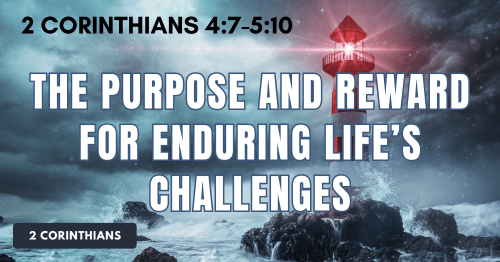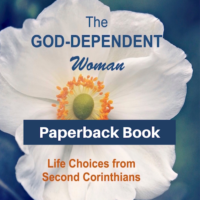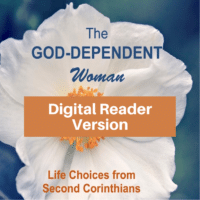2 Corinthians 4:7-5:10 • The Purpose and Reward for Enduring Life’s Challenges

AI was not used to generate this post.
When something goes wrong—you know, not the way you planned or imagined, do you may feel helpless as a victim of circumstances? Or do you constantly dwell on your mistakes, wishing you could go back and change a decision you made? Do you have a tendency to focus on your inadequacies and weaknesses? Would you like to know how to stop doing that? You have come to the right place. In the last article, we explored what it means to be transformed into the aroma of Christ as we are made into His likeness. This is post #5 in the God-Dependent Woman blog series. We will let 2 Corinthians 4:7-5:10 show us God’s purpose and reward for enduring your life challenges as God-dependent women. Then, you can stop dwelling on your circumstances, mistakes, and inadequacies.
Key Takeaways
- The article discusses how to endure life’s challenges as God-dependent women, focusing on the importance of trusting God during difficult times.
- It emphasizes that God overcomes our weaknesses, mistakes, and inadequacies, showing His greater purpose and reward for enduring hardships.
- The author encourages readers to change their perspective, looking at God’s purpose and the strength gained through endurance in their lives.
- Biblical truths are presented, highlighting that endurance develops strength and maturity, teaching us to depend on God rather than ourselves.
- Ultimately, the article reassures that God loves us and will reward our faithfulness and trust in Him through life’s trials.
Listen to this post as a similar podcast from The God-Dependent Woman Bible Study covering 2 Corinthians in the New Testament. (11 lessons)
God Overcomes Your Weaknesses
We are the aroma of God spreading everywhere the knowledge of Him. We are also a living letter presenting Christ to those who are “reading” you. And we are an illustration of being transformed by the Holy Spirit into the image of Christ so that our lives will show God’s glory to others. But whether you will be a delightful aroma, an inviting letter, or a clear image of Christ depends on how much you are relying on God to lead you and change you. Confidence in God encourages dependence on Him.
Often, we look at our frail human bodies and say, “Lord, how can you use me with all my weaknesses.” The best news is that God overcomes your weaknesses with His power as you trust in Him.
When something goes wrong—you know, not the way you planned or imagined, you may feel helpless as a victim of circumstances. Or you might be the person who dwells on your mistakes. You may focus on your inadequacy, not being enough of…whatever. Sadly, other people like to point out all those weaknesses in your life making you feel even worse about them. Have you experienced that?
Our God calls us to live by faith. Faith involves trust in a God who loves us, who cares, who can guide us, and knows all about our weaknesses. Paul writes this in 2 Corinthians 4:7
But we have this treasure in jars of clay to show that this all-surpassing power is from God and not from us. (2 Corinthians 4:7)
We have this treasure of God’s life in our frail human bodies—jars of clay. That is not a bad thing. We have someone who understands.
For we do not have a high priest who is unable to empathize with our weaknesses, but we have one who has been tempted in every way, just as we are—yet he did not sin. Let us then approach God’s throne of grace with confidence, so that we may receive mercy and find grace to help us in our time of need. (Hebrews 4:15-16)
Jesus understands our weaknesses because He has been tempted in every way, just as we are. We can approach His throne of grace with confidence that we will receive mercy and help in our time of need from someone who understands.
God helps us in our weakness and works for our good according to His purpose for us. That tells me that our God has bigger purposes for our weaknesses than what we see or know each step of the way. When it comes to our circumstances, our mistakes, and our feelings of inadequacy, He asks us to trust that He is bigger than all of those.
God Is Bigger Than Your Circumstances
You can know that God is bigger than your circumstances.
Circumstances are those conditions affecting our lives that are beyond our control or ability to “fix.”
Think of Paul’s circumstances. In chapter 1, he said that he and his friends were under great pressure far beyond their ability to endure. They were in deadly peril that was out of their control. They did not do anything wrong. God allowed that pressure and peril for many reasons including what they themselves would learn about trusting God through those horrific circumstances. Confidence in God encourages dependence on Him. And this is why:
But we have this treasure in jars of clay to show that this all-surpassing power is from God and not from us. We are hard pressed on every side, but not crushed; perplexed, but not in despair; persecuted, but not abandoned; struck down, but not destroyed. (2 Corinthians 4:7-9)
Our God is faithful to not let us be crushed or destroyed even in the worst of circumstances. He does not abandon us. We can trust Him.
You may be facing your own version of desperate circumstances—health problems, lack of income, bad relationships, or problems someone or something else caused. Remember the coronavirus pandemic of 2020? That was a dangerous, deadly time for many older people.
Having to face those circumstances leaves you with choices. You can become whiny and bitter. Or you can depend upon God to get you through them. You can depend on God in the pain of relationships, health problems, and lack of income. It is even likely that you would learn to see and appreciate God’s gifts to you in a greater way.
God is bigger than your circumstances. If He wasn’t, He would not be God.
God Is Bigger Than Your Mistakes
You can also know that God is bigger than your mistakes. I think of mistakes as being of two kinds.
- The first kind is willfully going against clear Biblical guidance about what is right and wrong. When we do that, we usually figure out pretty quickly that it is a mistake.
- The second kind is attempting to “fix a problem” without clear Biblical guidance. When it doesn’t turn out as expected, I have a tendency to regret that decision as a “mistake.” Do you?
But what about those things not clearly defined as right and wrong in the Bible—where you live, where you work, where to invest money? God has given us a mind to use for making decisions in those areas of life. So we should pray, ask for guidance from the Holy Spirit, get advice from other believers, check to see if it is legal, then make the decision and act on it.
Life is daily. When we read the Scriptures, we don’t see God telling the people what to do every minute of every day. Living by faith includes the whole process of trusting God while making a decision and trusting God with the results of it. It is all about faith, not about being perfect.
God is bigger than your mistakes. If He wasn’t, He wouldn’t be God.
God Is Bigger Than Your Inadequacies
You can know that God is bigger than your inadequacies.
To be “inadequate” means failing to reach an expected or required standard, to be insufficient and lacking.
Some of us wallow in our inadequacies. God knows all about those things in which we feel insufficient or lacking. Just not enough.
Sometimes, He leaves us to ourselves so we will recognize how insufficient we are without Him. Then, we will desire Him more. Have you noticed this in your life? I have in mine.
Thankfully, God is bigger than your inadequacies. If He wasn’t, He would not be God.
See examples in a woman’s life from this article, “Sarah: God Is Bigger Than Your Weaknesses.”
Press on Beyond Those Weaknesses
Stop the wrong responses
So dear reader, stop responding to desperate circumstances with hysteria. End that replaying of your mistakes over and over in your mind. Quit wallowing in your inadequacies.
The question to ask now is this. “What are you going to do today to press on beyond that? You press on by changing your perspective to look at God’s purpose for you as you endure those difficult things.
View God’s purpose for you
I had a wonderful friend and mentor who continually reminded us how amazing were these verses in 2 Corinthians chapter 4:
Therefore we do not lose heart. Though outwardly we are wasting away, yet inwardly we are being renewed day by day. For our light and momentary troubles are achieving for us an eternal glory that far outweighs them all. So we fix our eyes not on what is seen, but on what is unseen, since what is seen is temporary, but what is unseen is eternal. (2 Corinthians 4:16-18)
Paul lists much of what happened to him over the years in 2 Corinthians chapters 6 and 11. His list includes beatings, shipwrecks, being robbed, imprisoned, chased down, and going hungry. How can he call those “light and momentary troubles?!” Could you?
The key for Paul and for you is to look at the purpose and reward for enduring the troubles of life. We already know that God wants us to rely on Him more than on ourselves as we go through the bad times as well as the good times of life. He promises us that He has a greater purpose and there will be a reward for our endurance.
As Paul said in 2 Corinthians chapter 1
If we are distressed, it is for your comfort and salvation; if we are comforted, it is for your comfort, which produces in you patient endurance of the same sufferings we suffer. (2 Corinthians 1:6)
What we go through during sufferings can produce something good—endurance.
Some Biblical Truths about Endurance
The Bible uses the word endurance a lot. We need to learn some biblical truths about endurance.
Truth #1: Endurance is good for us.
The Greek word translated “endurance” is a strong word that means “bearing under.” It is holding up a load with staying power and stick-to-it-iveness. Staying power requires some long-term burden, not just getting stuck in traffic. If we think of that as suffering, we are trivializing what Paul is saying. The troubles that develop endurance are not those of an afternoon. Endurance is good for us. It teaches us “staying power” for a long-term burden.
Truth #2: Endurance makes us stronger.
Think about how we can prevent osteoporosis, a condition where bones have lost so much density they look like “Swiss cheese,” making them weak. Holey bones are not good for anyone, especially older women. But to have strong bones requires regular intake of vitamin D and calcium plus load-bearing exercise. Nutrition alone will not develop strong bones. Bone needs to be stressed to become stronger.
Bible study alone will not develop endurance. Just like load-bearing exercise makes your bones stronger, troubles that challenge your faith do that, too.
Truth #3: Endurance is necessary to grow up into maturity.
Think about the process of human development. Teething, learning to walk and ride a bike, and adolescence are painful but necessary parts of developing into adulthood. The goal is to grow up into a fully functioning, responsible adult. Right?
What if my daddy never let me go away from home and experience challenges of personal decision-making? I could not grow up. What if my heavenly father never let me know any needs? I would not know how to rely on Him for real strength.
But here in America, we don’t necessarily desire endurance. We get sidetracked with our comforts and our rights. Without endurance, we become satisfied with immaturity. We have men and women refusing to grow up into maturity. In the workplace. In the home. In the church. That is what happens when we overprotect children from going through troubles so they don’t develop endurance and maturity. They have a huge hurdle to cross when it comes to following Jesus. God’s goal for us is to be mature and complete. Endurance is His tool to help us reach that goal, to grow up.
Truth #4: Endurance teaches us to depend on God more than on ourselves.
Remember this from 2 Corinthians chapter 1?
Now it is God who makes both us and you stand firm in Christ. (2 Corinthians 1:21)
God wants us to be able to stand firm in Christ. Going through troubles is God’s will for us. He allows things in our lives to challenge us, but His motive is not to trip us up. His motive is not to make us fail. He wants to develop that endurance in us. It is not so we don’t need Him any longer but that we would rely on Him more. He wants to make us stand firm in Him and to get us through “whatever.” Once again, we get the wrong message about this from social media.
Read more about the benefits of endurance in this article, Pathway #6: Keep Moving Forward.
Viewing Life from God’s Perspective
Another reward we get from endurance is the ability to view life from God’s perspective. This is not all there is.
The promise of a new body in a new home
For we know that if the earthly tent we live in is destroyed, we have a building from God, an eternal house in heaven, not built by human hands.… Now the one who has fashioned us for this very purpose is God, who has given us the Spirit as a deposit, guaranteeing what is to come. (2 Corinthians 5:1, 5)
We have the promise of a new body fashioned to live in our heavenly home with Christ. This is not wishful thinking. It is backed by God’s promise and guaranteed to us by the Spirit living inside of us from the moment we believed in Jesus.
Living by faith, not by sight now
We have this promise for the future, but we still live in these earthly bodies amid all the pain and perils of life. How do we view life from God’s perspective now?
For we live by faith, not by sight. … So we make it our goal to please him, whether we are at home in the body or away from it. (2 Corinthians 5:7, 9)
We live by faith in the God who is overseeing everything in our lives. Because we can trust Him and we love Him, we make it our goal to please Him with our lives. Faith pleases our God. Trusting Him pleases our God. Being God-dependent rather than self-dependent pleases our God. The reward will be joy even in the midst of the pain and peril.
Joy is the reward
Paul refers to “joy” repeatedly in this letter, referring to it as “overflowing” and “boundless.” Only the Lord Jesus Christ can fill our hearts with overflowing joy even in the midst of hardships. This joy comes from trusting Him and enduring life’s challenges with our eyes focused on God’s purposes for us more than what He is not doing to rid us of all the pain.
Do you try handling it all first then give it to God?
So, here is our saying to evaluate in this blog, “When you can no longer handle it yourself, give it to God.”
That is terrible advice. If you are supposed to be strong enough on your own to handle a difficult time but can’t handle it yourself, then you begin to focus on your weaknesses and feel like a failure. Right? You look at the awful circumstances as your fault. You replay mistakes over and over in your mind or wallow in your inadequacies because you can’t handle it yourself.
Here is the biblical truth, straight from the inspiration of the Holy Spirit through the pen of Paul, you are not—repeat NOT—supposed to handle it yourself. Whatever the difficult “it” is. You cannot handle it yourself, so rely on God from the get-go. That does not mean that God is not going to use your knowledge and experiences to handle the situation. But you are not to start out doing it on your own first.
To overcome this bad advice, remember what Yoda said in The Empire Strikes Back, “You must unlearn what you have learned.” The relearning includes viewing hardships and pain as “light and momentary troubles” that have a purpose and a reward (2 Corinthians 4:17).
Let me assure of this. God loves you. He knows what is going on in your life. He can do something about it. And you can trust His goodness in whatever He chooses to do. These are four truths that help you walk from fear to faith in your life.
Dear friends, we have a big God. He can take whatever is looking ugly in our lives and make it something praiseworthy. Maybe all that you have been through in life—desperate circumstances, blaring mistakes, and obvious inadequacies—have led to this moment when God has brought you to get this message so you can learn to rely on Him more than on yourself as you endure your life challenges.
Reasons Why God Wants Us to Depend on Him More Than on Ourselves
From 2 Corinthians 4:7-5:10, here are some reasons why God wants us to depend on Him more than on ourselves:
- He can demonstrate His power through our frailty, being jars of clay. (4:7)
- He keeps us from being crushed when we are burdened. (4:8-9)
- He reveals Jesus’s life in and through us. (4:10)
- He can keep us from losing heart. (4:16)
- He renews us inwardly while we outwardly “waste away.” (4:16)
- He gives us an eternal perspective about our “light, momentary troubles.” (4:18)
- He will give us a new resurrection/heavenly body as a reward. (4:14; 5:1; 5:5)
- Because we must live by faith not by sight. (5:7)
- We will be with Him when this life ends. (5:8)
- So we will learn how to live to please Him. (5:9)
- He rewards us for our earthly lives. (5:10)
Let Jesus satisfy your heart with confidence that you can depend on Him. Then, live each day as a God-dependent woman!
Read all the articles in our 2 Corinthians series. In the next post, we will look at how your life has purpose as a new creation in Christ.
All of the above information is covered in The God-Dependent Woman Bible Study covering 2 Corinthians in the New Testament.
AI was not used to generate this article.



This is so encouraging thank you!